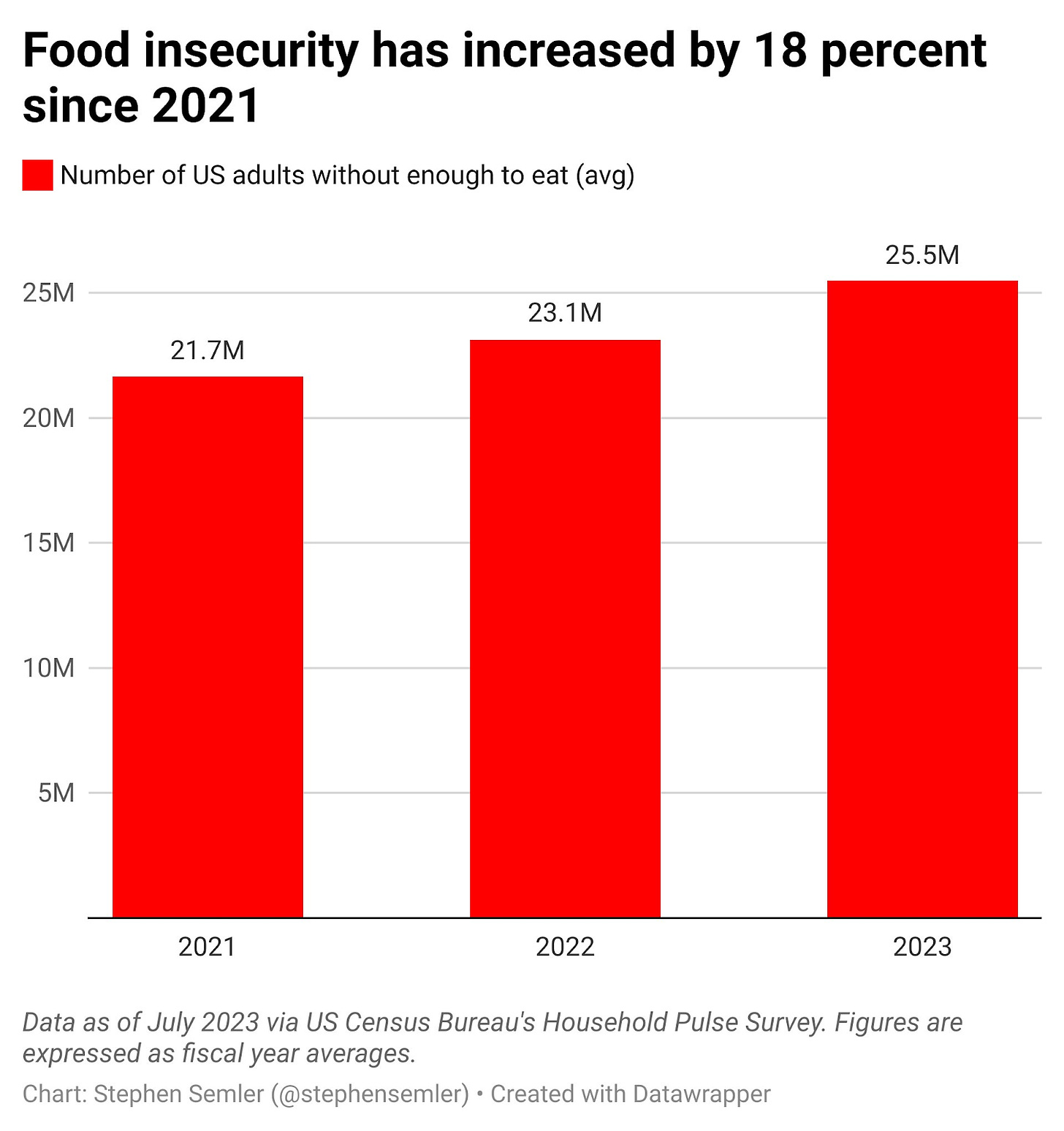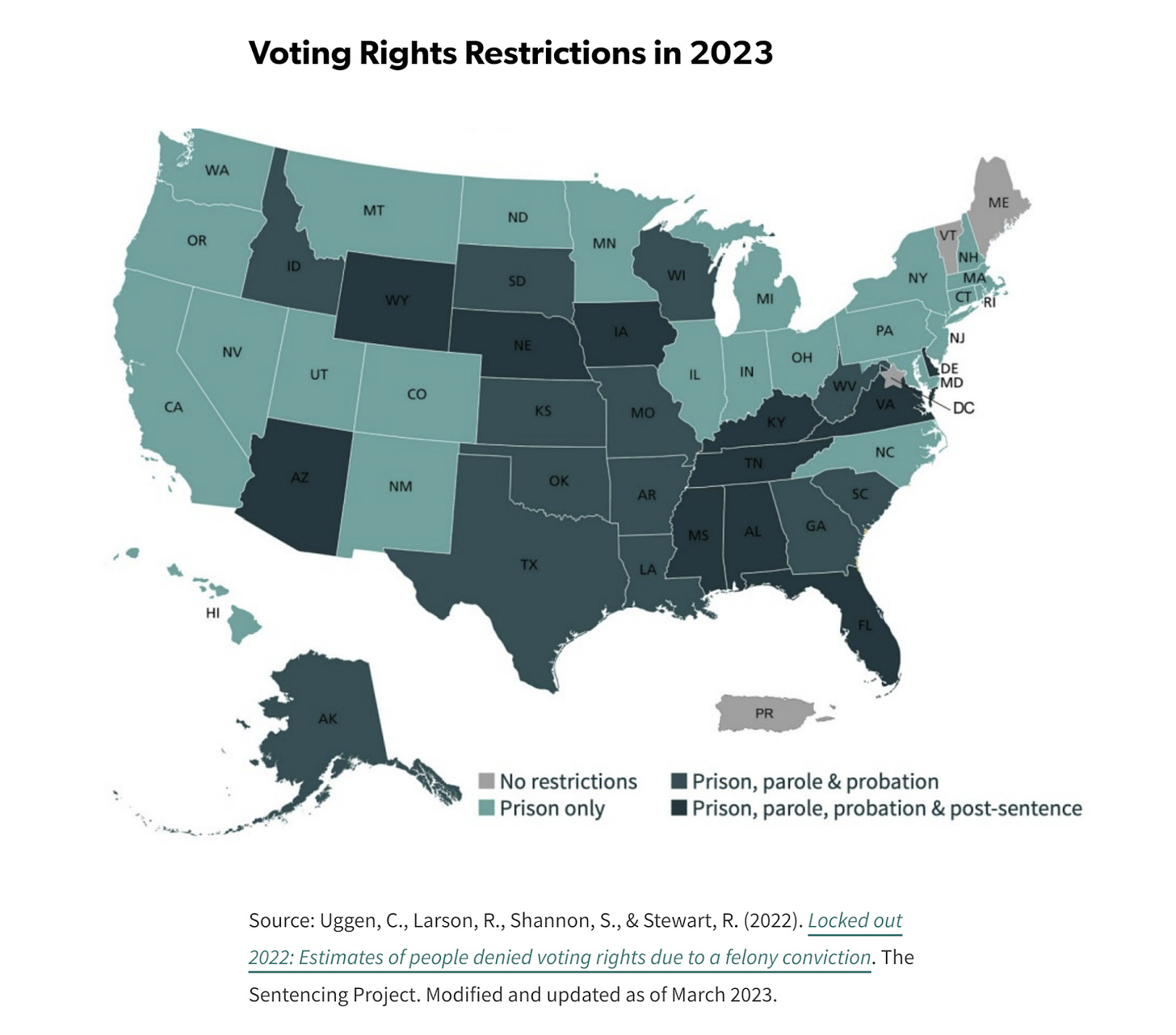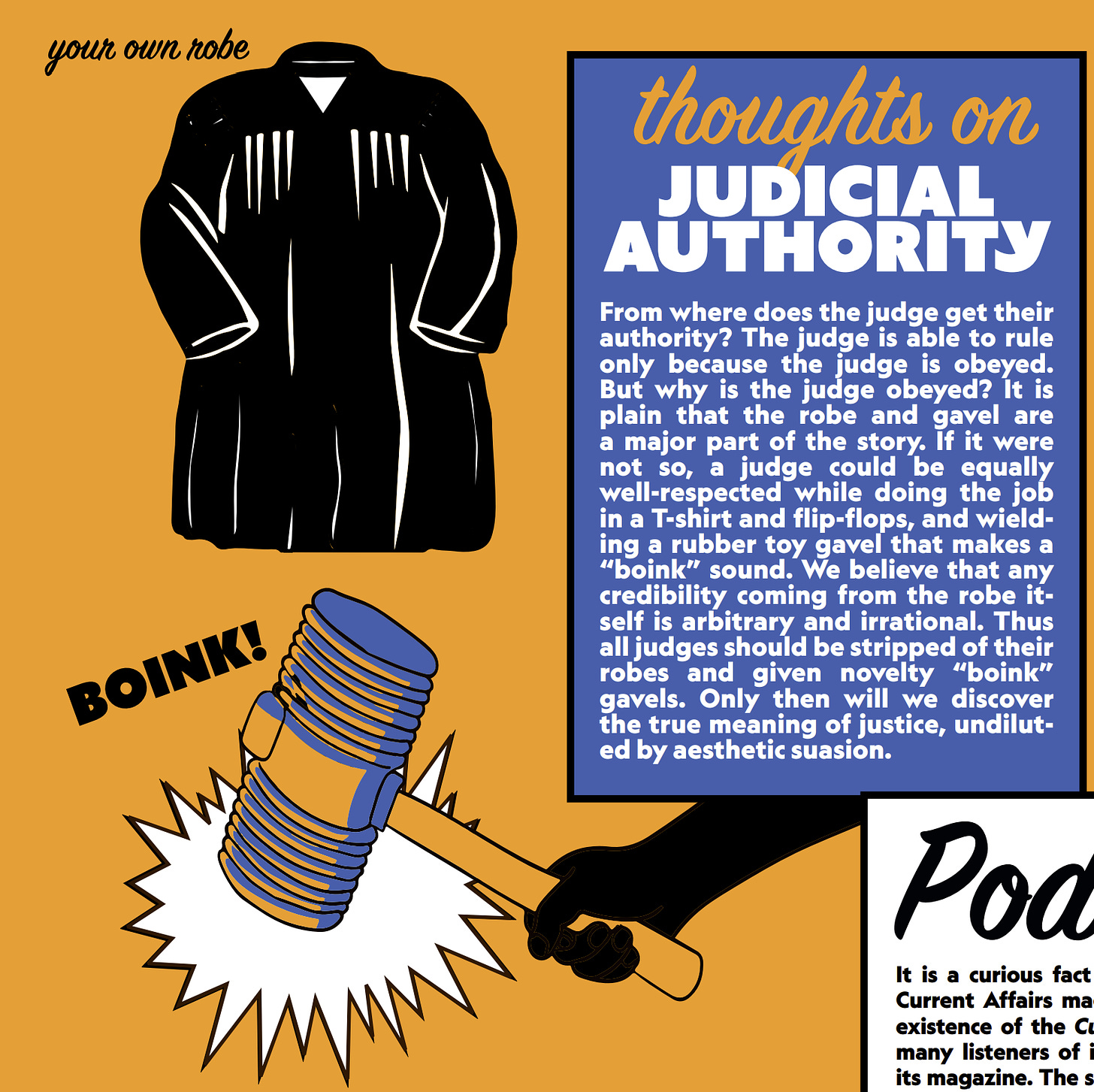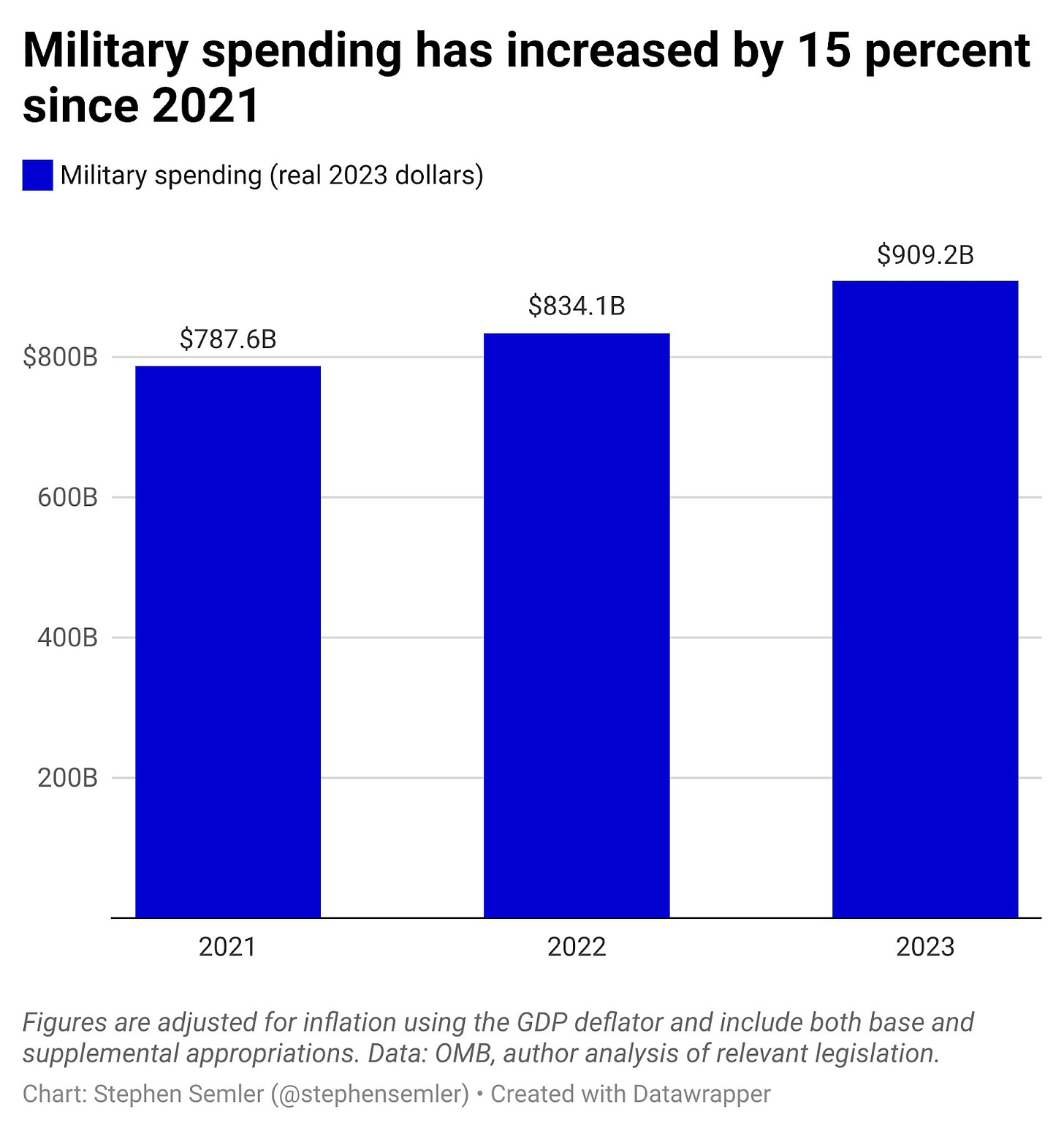Tuesday, Aug. 15, 2023 ❧ Trump approaches 100 charges, the nickname police, and worsening food insecurity...
Plus "Something" happens in Brooklyn, and special bonus guinea pig facts.
We don’t make the news. Personally we’d prefer a world without news, where all things were still and calm, and life moved like a gentle stream. But this is not the world we live in. In our world, things are happening all the time, nonstop, and it is fiendishly difficult to keep track of them all. This is why Current Affairs is here to brief you, by summarizing the day’s most critical events into this useful digest. This News Briefing is free of advertising and entirely supported by YOU, the reader—so if you haven’t already, please consider purchasing a paid subscription and helping us pay for the research, writing, fact-checking, and copy-editing. Oh, and if you’ve got suggestions for topics you’d like to see covered, email briefing@currentaffairs.org. And when you find at the end of this briefing that you simply must have more Current Affairs in your life, be sure to head over to our website where you can read our in-depth online stories and subscribe to our print magazine, which is known the world over for being the most beautiful magazine in existence. (Really! Get a subscription and see for yourself.)
STORIES THAT SHOULD BE BIGGER
USE OF FORCE ROUTINELY UNDERCOUNTED BY THE DHS
According to a new report from the U.S. Government Accountability Office (GAO), the Department of Homeland Security has consistently failed to keep accurate records on use-of-force incidents involving its agents. In ordinary English, “use-of-force incidents” can refer to everything from the execution of no-knock warrants to potentially lethal chokeholds, and as the Intercept’s Akela Lacy reports, these “incidents” are much more common than DHS data would indicate:
From April 2022 to July 2023, GAO audited four DHS agencies: Customs and Border Protection, the Federal Protective Service, Immigration and Customs Enforcement, and the Secret Service. “If officers used force multiple times during one event, the agency counted only one instance of force,” said Gretta Goodwin, a GAO director for homeland security and justice. After an encounter at the U.S. border, for example, Customs and Border Protection reported using force on a group of 62 subjects as a single use-of-force incident. GAO’s analysis also found that Federal Protective Service officers described using force 146 times in data from 2021 and 2022, while Federal Protective Service reported only 36 use-of-force incidents. In one case, according to GAO, Federal Protective Service counted 27 separate uses of force across 15 reports as a single incident.
Ostensibly, the DHS has its own internal review boards to evaluate whether particular uses of force are legitimate, but according to legal expert Katherine Hawkins, there is “little transparency on how they analyze cases,” and their rulings are typically in favor of DHS officers. Pressed by the GAO to issue “clarifying guidance” about the way it collects use-of-force statistics, the DHS “concurred,” but would commit only to conducting an analysis at some point in 2025. Surely the actions of an agency with nothing to hide.
MISSISSIPPI’S JIM CROW-ERA DISENFRANCHISEMENT LAW STRUCK DOWN BY FEDERAL COURT
A federal court just struck down a Jim Crow-era law in Mississippi that permanently disenfranchised people with felony convictions. Prior to being overturned, this constitutional amendment disenfranchised 10 percent of all Mississippi’s adult population from voting—the largest percentage of any state in the country. According to The Guardian, more than 90 percent of the people affected by the law had served their sentences.
This amendment was initially passed in 1890 as white Southerners were fighting back against the post-Civil War voting rights of Black people. The law explicitly targeted crimes Black people were viewed at the time as more likely to commit, such as murder, forgery, and bigamy. This racist legacy still exists it is modern enforcement: Nearly 16 percent of the Black voting population was blocked from the ballot box under this law.
The state technically allowed voting rights to be restored to individuals through a byzantine, nearly impossible process: individuals who’d been disenfranchised had to apply to have their voting rights restored, and their applications had to be approved by two-thirds of each chamber of the state legislature (a process so strange and arduous that only seven people successfully had their voting rights restored per year on average). It was ruled to be a “discretionary, standardless scheme” by the Fifth Circuit, which struck it down by a vote of 2-1 on Eighth Amendment grounds. The court (which is actually considered more conservative than the U.S. Supreme Court, despite what you may imagine given this ruling) also said the following about felony disenfranchisement as a whole:
“By severing former offenders from the body politic forever, [the state’s policy] ensures that they will never be fully rehabilitated, continues to punish them beyond the term their culpability requires, and serves no protective function to society… It is thus a cruel and unusual punishment.”
The law had been challenged before, but the U.S. Supreme Court declined to hear the case (despite the outrage of its liberal flank). Given the high court’s general hostility to federal interventions in states’ disenfranchisement laws (particularly the right-wing triumvirate of Thomas, Alito, and Gorsuch), it’s possible that they may change their tune now that Mississippi’s law has been overturned. It would only take one more justice to join them in order for the case to be heard. However, the majority did surprisingly defend the Voting Rights Act by a 5-4 vote earlier this summer, so it’s possible that they might maintain the lower court’s ruling against Mississippi.
Nevertheless, seven other states still disenfranchise people after the completion of their sentences, and an estimated 5.85 million people in the U.S. are barred from voting due to felony convictions. According to The Sentencing Project—three out of four of them are out of prison.
As The Sentencing Project says,
No other democratic country in the world denies as many people—in absolute or proportional terms—the right to vote because of felony convictions. The extent of disenfranchisement in the United States is as troubling as the fact that the right to vote can be lost for relatively minor offenses. An offender who receives probation for a single sale of drugs can face a lifetime of disenfranchisement. Restrictions on the franchise in the United States seem to be singularly unreasonable as well as racially discriminatory, in violation of democratic principles and international human rights law.
ARE SUPREME COURT JUSTICES ABOVE THE LAW OR NOT?
It turns out that the extent of Justice Clarence Thomas’ corruption is even worse than previously realized. According to a new exposé from ProPublica, he has lived lavishly on the dime of benefactors who “share the ideology that drives his jurisprudence” over the course of his three decades on the high court:
Their gifts include: At least 38 destination vacations, including a previously unreported voyage on a yacht around the Bahamas; 26 private jet flights, plus an additional eight by helicopter; a dozen VIP passes to professional and college sporting events, typically perched in the skybox; two stays at luxury resorts in Florida and Jamaica; and one standing invitation to an uber-exclusive golf club overlooking the Atlantic coast.”
Months ago, we learned about how Thomas was feted by the Texas oil billionaire Harlan Crow, who’d similarly wined and dined Thomas and even bought Thomas’ mother’s house and paid for his adopted child’s tuition. The most recent report reveals another heretofore unknown oil baron named Paul “Tony” Novelly who also gave Thomas gifts of value. ProPublica says the total value of their donations to him is “likely in the millions.” Thomas never reported most of these gifts in his financial disclosures, which means he likely broke federal law numerous times.
The question that remains, however, is whether Supreme Court justices are actually subject to laws at all. They can be impeached or resign, but other than a few vocal Squad members who have called for such steps, virtually no movement has taken place to hold Thomas (or Samuel Alito who was also given lavish treatment by rich donors) accountable. We give Supreme Court justices arguably more power and less oversight than anyone else who holds public office. Their decisions are often the final word on what rights hundreds of millions of Americans possess. But because of the persistent delusion that they are infallible deities uncorrupted by outside incentives, we put them under less scrutiny than most federal workers rather than more. Why in God’s name do we let Supreme Court justices get away with actions that would get a National Parks or Postal Service employee sent to jail?
BIG STORY
TRUMP INDICTMENT IV: FELONIOUS IN FULTON
After previously being indicted on a total of nearly 80 counts across three cases, Former President Trump has been indicted again in Fulton County, Georgia, on charges related to his attempts to overturn the state’s 2020 election results. A grand jury handed down a set of criminal charges against the president, including state racketeering counts, conspiracy to commit false statements, and solicitation of a violation of oath by a public officer. Additionally, 18 other Trump associates have been charged, including former Trump chief of staff Mark Meadows and lawyers Rudy Giuliani, John Eastman, and Sidney Powell (three attorneys who’d already been charged as part of Jack Smith’s January 6 indictment).
The charges stem from a phone call he made to Georgia Secretary of State Brad Raffensperger, who oversaw the presidential election in the state, essentially telling him to just give him enough votes to be declared the winner (which, for those unaware, is generally not how elections are supposed to work). After spouting off a theory about “dead voters” (which he apparently knew were false, according to prosecutors in a previous federal indictment), Trump told Raffensperger,
The people of Georgia are so angry at what happened to me… They know I won, won by hundreds of thousands of votes, it wasn’t close… I just want to find 11,780 votes, which is one more than we have because we won the state.
Many of the charges were expected, but some were surprised to see Trump up for Racketeer Influenced and Corrupt Organizations (RICO) charges too. As fans of The Sopranos will be well aware, racketeering charges are most commonly used against members of the mafia and other organized crime gangs. Fulton County District Attorney Fani Willis, who is prosecuting the case against Trump, also used RICO back in 2013 to prosecute teachers in a standardized testing cheating scandal. Clark Cunningham, a law professor at Georgia State University, told The Washington Post, “It allows a lot of different things to be pulled together into a single very serious criminal charge,” which can lead to up to 20 years in prison.
WORD OF THE WEEK
“Foomscrolling”
The word “doomscrolling” became common parlance during the Trump years to describe the hopeless feelings associated with absorbing social media’s interminable onslaught of negative information. But in the age of AI, it has a more optimistic cousin, named “foomscrolling,” which describes the feeling of elation associated with witnessing the possibilities presented by technological advances as they appear on our social media feeds. As Ross Andersen writes in The Atlantic, “The online frenzies that followed LK-99 [a floating space rock that appeared momentarily to be able to conduct electricity at room temperature without losing energy] and ChatGPT reveal a resurgent techno-optimism—and a shared longing for a new technology that will free us from human limits.” Some described the feeling of witnessing what is known in AI literature as a “foom,” which—according to Andersen—“occurs when an AI’s cascading self-improvements accelerate its own development until it becomes powerful beyond human comprehension. (The term is meant to evoke the sound of an explosive eruption.)”
Though the possibilities of AI momentarily enraptured the social media viewing public, Andersen argues that skepticism and malaise soon set in—turning the “foom” into a kind of doom all its own: “A cottage industry of AI influencers,” he said, “had paid-for blue checks and bios that carefully laundered their previous crypto enthusiasms. Initially, they were useful. The field was moving quickly and it was nice to have some aggregators of industry news, however credulous. But they soon overwhelmed the discourse with claims that this week’s list of mind-melting breakthroughs was even more extensive than the last. It all started to seem a little sad, like LinkedIn.” Indeed, it’s hard not to associate AI, at least as it’s marketed on social media, with the infestation of crypto giveaway scams and self-promoting hucksters who overpromise cutting-edge tools to get you in on the ground floor of the AI revolution. It also doesn’t help that, despite his promises to fight their proliferation on the platform, AI-powered spambots have only grown more powerful since Elon Musk took over Twitter.

But an underlying, largely under-discussed, problem with AI, is that its development is subservient to the whims, egos, and interests of the people who own it. As our editor-in-chief Nathan Robinson wrote in Jacobin earlier this year, “Most of the other problems AI could cause really boil down to problems of the way power and wealth are apportioned in our existing society. Because the world is organized into militarized nation-states, we have to worry that AI technology will be used in terrifying new superweapons. Because we let scams and fraud flourish in our Wild West economy, we will see a lot of people get rich using AI to prey on hapless consumers. The profit motive is already socially destructive, but AI will make it much worse, because it will allow companies to figure out how to more efficiently trick and exploit people. The new technologies are being developed by private corporations that have no incentive to ensure that a benefit to them is a benefit to all.”
Foomscrolling’s quick death, is a symptom of our collective realization that without changing the underlying incentives for AI’s creation, it will never be the tool for human liberation that it could be. As long as its powers remain in the hands of a small unaccountable sliver of society, its trajectory will be determined by how it best benefits them.
AROUND THE STATES
Full-time UPS drivers will earn $170,000 in pay and benefits by the end of the new five-year contract that was agreed to last month, according to UPS CEO Carol Tomé (You can view our coverage of the agreement in more detail in a previous briefing). Altogether, this is a salary increase of $25,000. According to Indeed, their base salary of $102,000 per year puts them in the same league as software developers, finance directors, and physician assistants. Part-time employees will make $25.75 per hour while receiving full healthcare and pension benefits. These gains come after UPS caved to its workers’ demands for better compensation after more than 340,000 threatened to strike under the Teamsters banner. The entire labor movement should absolutely celebrate these gains! However, as Jane McAlevey pointed out last month in The Nation,
We shouldn’t lose sight of the fact that… they represent a restoration of previous standards the workers had enjoyed before the [James] Hoffa, Jr. administration [which led the Teamsters from 1998 to 2022] traded them away. Still, in the current climate winning back that which was taken away is no small feat. But workers also need more. As a movement, we need to remain sharply aware of moments when we have sufficient leverage to set new standards and pay it forward, rather than limiting ourselves to restoring previous gains.
Nicknames must now be parent-approved in Florida. The party of free speech and small government is at it again. In Florida’s Orange County, any student who wants to use a nickname at school must now get a signed permission slip: “As an example, if the student is named Robert, but likes to be called the nickname Rob, the form must be filled out authorizing teachers and other personnel to call Robert the nickname Rob,” the new guidelines state.” The move comes after the election, last November, of a slew of right-wing school board officials aligned with Governor Ron DeSantis and the anti-trans extremist group Moms for Liberty. As the Intercept’s Natasha Lennard notes, the new policy is transparently targeted at non-gender-conforming kids: if “Rob” is verboten without parental approval, so is “Roberta.” Now, any trans student in Orange County has to choose between remaining in the closet, and being forcibly outed in a situation where it may threaten their safety. One can only hope this blatantly unconstitutional restriction on First Amendment rights in the classroom will be swiftly challenged, and struck down.
The Rhode Island House primary is heating up. With less than a month to the September 5 polling date, Rhode Island’s crowded Democratic field has become a “proxy battle” between leftists and moderates, according to The American Prospect’s Luke Goldstein. In the left’s corner is Aaron Regunberg, a former state House Representative who supports Medicare for All and has the endorsement of Senator Bernie Sanders. In opposition is incumbent Lieutenant Governor Sabina Matos, backed by the pro-business New Democrat Coalition. Currently, polls show Matos in the lead—but a recent scandal about forged signatures, used to get her on the ballot in the first place, may change that. One to watch!
LONG READ: Following the catastrophic train derailment that sent clouds of carcinogenic vinyl chloride billowing across East Palestine, Ohio earlier this year, a bipartisan rail safety bill was proposed in Congress. Matthew Cunningham-Cook and Julia Rock write in The Lever about how the company that manufactures the toxic chemical gave $2 million to GOP lawmakers to stall and water down the bill:
On May 10, Sen. J.D. Vance (R-Ohio) and Senate Commerce, Science and Transportation Committee chair Maria Cantwell (D-Wash.) proposed comprehensive amendments to the rail safety legislation, which Vance had originally co-authored. One of the amendments delayed by three years the requirement that shippers replace old tank cars that are vulnerable to punctures with upgraded cars, as The Lever previously reported. Federal regulators had recommended the 2025 deadline included in the original bill, but chemical and rail supply industry lobbyists pushed for a delay. [Occidental Petroleum, which manufactures the vinyl chloride that spilled during the accident] donated $2 million in June to the Senate Leadership Fund, the main super PAC for Senate Republicans, three weeks after the railroad bill was weakened in committee. The Senate Leadership Fund spent $32 million to help elect Vance last fall. During the 2022 election cycle, Occidental funneled $5.5 million to the committee, making it the super PAC’s largest corporate donor.
IMPORTANT NEWS:
SOMETHING IS GOING ON

AROUND THE WORLD
A presidential candidate in Ecuador, Fernando Villavicencio, was assassinated at a campaign rally in Quito last week, and six suspects—all Colombian—have been arrested. Villavicencio had centered his campaign around fighting organized crime and drug trafficking, which have gained an increasing foothold in the country in recent years and have significant links to many government officials—he said their influence has turned Ecuador into a “narco state.” Villavicencio had been threatened multiple times by cartel members, but had said expected popular support to be “my bulletproof vest.” Violence has spiked significantly in Ecuador since 2020, and it has become the single largest hub for cocaine trafficking in the world. As Brian Osgood writes in Al Jazeera,
Ecuador was once regarded as a source of relative calm in a region with a long history of violence and civil conflict… [Covid-19] contributed to a severe economic downturn that Ecuador is still recovering from, and experts say a lack of employment opportunities has created a growing pool of potential recruits for criminal groups. Government statistics indicate that less than four out of 10 Ecuadorians participating in the workforce were adequately employed, with the majority making less than the minimum wage of $450 a month. Since the beginning of the year, more than 822,000 people between the ages of 18 and 45 have left the country seeking opportunities elsewhere.
Following the military coup in Niger two weeks ago, we mentioned that at least one of the plotters had been trained by the United States, which has around 1,000 troops stationed in the country. As more information has come out, The Intercept’s Nick Turse reported that at least five of the members of Niger’s new ruling junta have received American training. American-trained officers have taken part in 11 coups in West Africa just since 2008, in the countries of Burkina Faso, Mali, the Gambia, Guinea, Mauritania, and now Niger. And though the U.S. is required to stop funding military regimes after they overthrow democratic governments (as Secretary of State Antony Blinken did with Niger last week), America is still funding and training the regimes in Mali and Burkina Faso (The Biden administration’s Pentagon and State Dept. have even pushed for more funding for the latter). Both of which have committed many human rights violations. And although the U.S. is supposedly in the Sahel to fight terrorism, it has grown dramatically in the Sahel region since America’s arrival there in 2013 (with the largest increase occurring in Niger). As Stephanie Savell, an expert on U.S. military efforts in West Africa, told The Intercept,
The major issues fueling conflict in Niger and the Sahel are not military in nature — they stem from people’s frustration with poverty, the legacy of colonialism, elite corruption, and political and ethnic tensions and injustices. Yet rather than address these issues, the U.S. government has prioritized sending weapons and funding and training the region’s militaries to wage their own wars on terror.
The British government is slowly, stealthily privatizing the NHS. In Jacobin, Grace Blakeley recounts how years of underinvestment have left the public health service—by some measure, the best thing the UK has ever produced—in a state of disrepair:
“Austerity saw the longest spending squeeze in NHS history, with health spending increasing by just 1.5 percent annually between 2009–10 and 2018–19, compared to 3.6 percent per year on average. The consequences of this — as the population grew older, poorer, and less healthy — were stark and left the NHS facing both staffing shortages and crumbling infrastructure.”
With funds for public health care artificially choked off, private capital rushes to fill the gap. In 2020, Blakeley writes, “Spending on private health rose from 0.54 percent of all health care spending to 2.33 percent,” and 13 percent of British citizens now use private health insurance. Even Keir Starmer’s Labour is complicit in this looting and profiteering, with shadow health secretary Wes Streeting indicating that he would “use private hospitals to bolster the NHS.”
The U.S. ambassador to Australia has hinted at a possible plea deal for Julian Assange. In an exchange with reporters from the Sydney Morning Herald, U.S. ambassador Caroline Kennedy was asked if there could be a “diplomatic outcome” to the ongoing criminal case against Assange, who is currently imprisoned in the UK’s high-security Belmarsh Prison. Since his election in 2022, Australian Prime Minister Anthony Albanese has advocated for Assange’s release, and there have been reports that the United States’ push to extradite Assange, an Australian citizen, has become a “sticking point” in the alliance between the two countries. Now, Kennedy has indicated that there “absolutely could be a resolution,” although she insists that “it’s not really a diplomatic issue.” Speaking to Sky News, Assange’s brother Gabriel Shipton said the ambassador’s comments show that U.S. officials are “looking for an off-ramp” to an “extremely controversial press-freedom prosecution,” and could offer a plea deal to Assange in the coming months. Whether the whistleblower would accept such a deal, and what its terms would be, remains unclear.
CROOKS vs. SICKOS (or, “What are our politicians up to?”)
Hunter Biden could wind up in federal court. Last Friday, Attorney General Merrick Garland made a surprise announcement, promoting David Weiss—the U.S. Attorney who’s been investigating President Biden’s notorious son since 2018—to special counsel. In his new role, Weiss will be able to file criminal charges against Hunter in any jurisdiction, and he’s publicly stated that he believes the tax-fraud case against him “will not resolve short of a trial.” As our editor-in-chief has recently written, Hunter Biden has long been a prime example of grotesque privilege, but the DoJ’s need to appear fair and impartial in the wake of Donald Trump’s many, many indictments may open him to actual prosecution this time.
A COUPLE OF TOTALLY UNRELATED CHARTS

GUINEA PIG FACT OF THE DAY
Guinea pigs are not from Guinea, nor do they share any ancestry with pigs! So why are they called that? Guinea pigs are actually native to the Andes in South America, and were bred by the Peruvian Incas for more than 300 years before Spanish colonization. When they were first brought to England in the 16th century as exotic pets, they cost one “guinea” (equivalent to one pound and one shilling) to purchase.

As for why they are called “pigs,” it refers back to their Latin taxonomy: Cavia porcellus— “porcellus” meaning “little pig.” Why Carl Linnaeus, the father of Latin binomial nomenclature, referred to them as pigs, is not entirely clear. However, the guinea pig enthusiasts over at HayPigs.com believe it could have something to do with their pig-like physiques, including “large heads, a stubby neck and round body.” Meanwhile, the signature “wheek, wheek!” noise they make resembles a pig’s squeal.

Writing and research by Stephen Prager and Alex Skopic. Editing and additional material by Nathan J. Robinson and Lily Sánchez. Fact-checking by Justin Ward. This news briefing is a product of Current Affairs Magazine. Subscribe to our gorgeous and informative print edition here, and our delightful podcast here. Current Affairs is 100% reader supported and depends on your subscriptions and donations.










